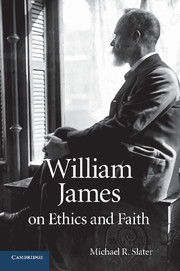Book contents
- Frontmatter
- Contents
- Acknowledgements
- Introduction: a practical faith
- PART I PRACTICAL FAITH AND THE WILL TO BELIEVE
- PART II TWO MORAL ARGUMENTS FOR RELIGIOUS FAITH
- PART III PIECEMEAL SUPERNATURALISM AND PRACTICAL NEEDS
- 5 Religion and morality in The Varieties of Religious Experience
- 6 A pragmatic account of religion
- Epilogue
- Bibliography
- Index
6 - A pragmatic account of religion
Published online by Cambridge University Press: 03 February 2010
- Frontmatter
- Contents
- Acknowledgements
- Introduction: a practical faith
- PART I PRACTICAL FAITH AND THE WILL TO BELIEVE
- PART II TWO MORAL ARGUMENTS FOR RELIGIOUS FAITH
- PART III PIECEMEAL SUPERNATURALISM AND PRACTICAL NEEDS
- 5 Religion and morality in The Varieties of Religious Experience
- 6 A pragmatic account of religion
- Epilogue
- Bibliography
- Index
Summary
In the last chapter we examined James's case for believing that religion is “an essential organ of our life, performing a function which no other portion of our nature can so successfully fulfill,” and saw that for James this function is moral in nature (VRE, 49). Specifically, we saw that on James's view the essential function of religion is to provide an extraordinarily secure form of happiness and levels of moral energy that morality alone cannot provide, which we analyzed in terms of two distinct but complementary moral needs: the need for metaphysical intimacy, and the need to lead a morally strenuous life. As in previous chapters, it was shown that James's interest in religion was primarily practical in nature, and that he undertook to justify religious belief under certain conditions on account of its practical value for life. We also saw, however, that James was no longer content merely to provide a warrant for religious belief on practical grounds, and that in Varieties he began to deal in a serious way with questions concerning the reality of religious objects and the truth of religious beliefs. As James makes explicit toward the end of that work, his view is that religious experiences possess “ enormous biological worth” irrespective of their possible truth-value; but he also claims that truth means “something additional to bare value for life, although the natural propensity of man is to believe that whatever has great value for life is thereby certified as true” (VRE, 401).
- Type
- Chapter
- Information
- William James on Ethics and Faith , pp. 165 - 232Publisher: Cambridge University PressPrint publication year: 2009

